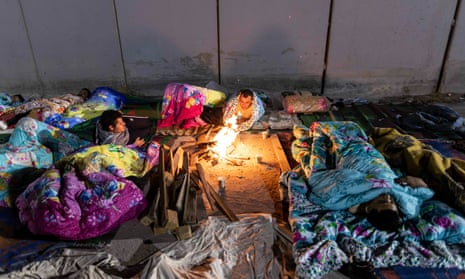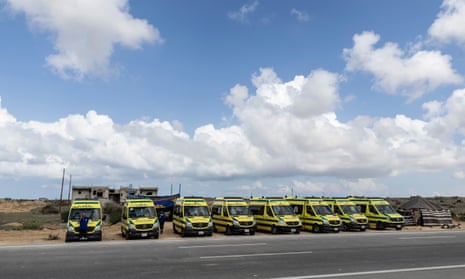Israel-Hamas war live: Gaza aid could start arriving from Friday; Sunak to meet Netanyahu in Tel Aviv | Israel-Hamas war
Key events
How long until aid reaches Gaza?
Biden said Egypt’s president agreed to open the crossing and to let in an initial group of 20 trucks with humanitarian aid. If Hamas confiscates aid, “it will end,” he said. The aid will start moving Friday at the earliest, White House officials said.
He added that the 20 trucks represented a “first tranche,” but “150 or something” trucks are waiting in total. Whether the rest are allowed to cross will depend on “how it goes.”
Egypt says the roads across the border need to be repaired after they were hit by Israeli airstrikes. More than 200 trucks and 3,000 tons of aid are positioned at or near the Rafah crossing, according to the head of the Red Crescent for North Sinai, Khalid Zayed.
Supplies will go in under supervision of the UN, Egyptian foreign minister Sameh Shoukry told Al-Arabiya TV. Asked if foreigners and dual nationals seeking to leave would be let through, he said: “As long as the crossing is operating normally and the [crossing] facility has been repaired.”
Why has Egypt been reluctant to open the border to civilians?
Egypt and Jordan flank Israel on opposite sides and share borders with Gaza and the occupied West Bank, respectively. Both have have been reticent to allow displaced Palestinians in.
Egyptian President Abdel Fattah el-Sissi made his toughest remarks yet on Wednesday, saying the current war was not just aimed at fighting Hamas, which rules the Gaza Strip, “but also an attempt to push the civilian inhabitants to … migrate to Egypt.” He warned this could wreck peace in the region.
Palestinians could instead be moved to Israel’s Negev desert “till the militants are dealt with”, Egyptian president Abdel Fattah al-Sisi told a joint press conference in Cairo with German chancellor Olaf Scholz.

“What is happening now in Gaza is an attempt to force civilian residents to take refugee and migrate to Egypt, which should not be accepted,” said Sisi.
“Egypt rejects any attempt to resolve the Palestinian issue by military means or through the forced displacement of Palestinians from their land, which would come at the expense of the countries of the region,” he said.
Sisi said the Egyptian people would “go out and protest in their millions … if called upon to do so” against any displacement of Gaza’s residents to Sinai.
Referring to the Egyptian position at a Beirut press conference, Hamas official Osama Hamdan called “for rallying around this position and supporting it on the popular and Arab official level because this represents real protection for our Palestinian people.”
What is the Rafah border crossing?
Israel, the White House and Egypt have confirmed that limited aid will be allowed to travel into Gaza through the Rafah border crossing with Egypt.
Foreign passport holders are also expected to be allowed out under any deal to reopen the crossing, after many headed to the vicinity in recent days seeking to exit.
Meanwhile, Israel has called on Gazans to move southwards closer to Rafah to shelter from bombardment. Here is a look at the situation and the history of the Rafah crossing.
The Rafah crossing is Gaza’s only connection to Egypt. It is the sole route for aid to enter Gaza directly from outside Israel and the only exit that does not lead to Israeli territory.
It has become a focus in the intensifying conflict between Israel and the Palestinian militant group Hamas, as hundreds of thousands of Palestinians have headed towards southern Gaza after Israel warned them to leave Gaza City and the enclave’s north.

Since Hamas took control of Gaza in 2007, Egypt has helped enforce a blockade of the enclave and heavily restricted the flow of people and goods through the crossing. Like the main crossings with Israel, restrictions have sometimes been eased but not lifted, and travellers need security clearance and lengthy checks to pass. In 2008, tens of thousands of Palestinians crossed into Sinai after Hamas blasted holes in border fortifications, prompting Egypt to build a stone and cement wall.
Egypt has acted as a mediator between Israel and Palestinian factions during past conflicts and periods of unrest. But in those situations it has also locked down the border, allowing aid to enter and medical evacuees to leave but preventing any large-scale movement of people.
Even as Israel pursues its unrelenting bombardment of Gaza in response to the Hamas assault, Egypt has shown no sign so far that its approach will change.
The Israel Defence Forces has just posted an update to X in which it said it “continues to attack all the time throughout the Gaza Strip”.
“During the last day, the IDF, directed by the Shin Bet, destroyed hundreds of Hamas terrorist infrastructures, dozens of which were attacked in the Sageya neighborhood. The hundreds of terrorist infrastructures that were attacked include anti-tank missile launch sites, tunnel shafts, intelligence infrastructures, operational headquarters and other headquarters,” the IDF said.
It claimed to have killed ““the head of the military wing of the terrorist organisation People’s Resistance Committees in Rafah, Rafat Harev Hossein Abu Halal” as well as “a number of operatives belonging to the Najaba force of Hamas”.
Egyptian soccer star Mohamed Salah, arguably the most celebrated Arab footballer, called on world leaders to “come together to prevent further slaughter of all innocent souls” and for the urgent delivery of humanitarian aid to the people in Gaza.
“There has been too much violence and too much heartbreak and brutality,” the Liverpool striker said in a video that lasted a little under a minute. “The escalations in the recent weeks is unbearable to witness. All lives are sacred and must be protected. The massacres need to stop. Families are being torn apart.”

Aid to Gaza “must be allowed immediately,” he added. “The people there are in terrible conditions.”
They were Salah’s first comments on the Israel-Hamas war, after he was criticized by some Arab fans for his silence.
Officials said Wednesday that some aid will begin flowing into Gaza in the coming days.
The Gaza health ministry said 3,478 people have been killed in Gaza since the war began, and more than 12,000 wounded, mostly women, children and elderly people.
More than 1,400 people in Israel have died, mostly civilians killed during Hamas’ deadly incursion on 7 October.
Arab leaders have told US secretary of state Antony Blinken – who has been crisscrossing the region this past week – that they oppose collective punishment against ordinary Palestinians, which they fear will trigger regional unrest.
The fear among world leaders and diplomats is that the war will spread beyond the confines of Gaza, with Lebanon’s Hezbollah and its backer Iran opening major new fronts in support of Hamas.
The Israeli government struck a Syrian military position in the war-torn country’s south, according to a war monitoring NGO
The UK-based Syrian Observatory for Human Rights, which has a vast network of sources in the country, said the sound of explosions could be heard the Golan Heights.
The reported strike on Syria coincided with an announcement by the Israeli army of strikes against “terrorist positions” of Hezbollah in Lebanon.
Xi says will work with Egypt to help stabilise Middle East
Chinese President Xi Jinping told Egypt’s prime minister on Thursday that Beijing hoped to work with his country to bring “more stability” to the Middle East, state media reported.
“China is willing to enhance cooperation with Egypt… and inject more certainty and stability into the region and the world,” Xi told Mostafa Madbouli at a meeting in Beijing, according to state broadcaster CCTV.
“China and Egypt are good friends who share the same goals and trust each other, and good partners who work hand-in-hand for development and common prosperity”, CCTV reported Xi as saying.
“At present, the international and regional situation is undergoing profound and complex changes, and the world is experiencing rapid changes not seen for a century,” Xi added.
Beijing was also willing to work with Cairo to “jointly safeguard international fairness and justice as well as the common interests of developing countries”, he said.
EU ministers to meet on security
Reuters: The European Union’s migration ministers meet on Thursday to discuss improving security in the bloc after deadly attacks in France and Belgium, as well as worries whether the war between Israel and Hamas would force mass displacement of people.
Some in the 27-nation bloc have already called for tighter borders, more repatriations of foreigners and new deals with African states to keep refugees and migrants from Europe since a Tunisian failed asylum-seeker killed two in Brussels on Monday.
A teacher was slain in northern France last week in an attack President Emmanuel Macron condemned as “Islamist terrorism”.
The killings occurred at a time of heightened security concerns across much of Europe linked to the Israel-Hamas war.
“The implications of the situation in the Middle East for our internal security… are very topical right now,” said an EU diplomat involved in preparing the ministerial talks.
“Both with regard to the situation as it develops in the Middle East and to what we’re seeing happening inside of the EU.”
The ministers are not expected to take any specific decisions but will discuss topics including what particular developments could cause Palestinians to flee in large numbers, or trigger violent acts inside the bloc.
Sunak to meet Netanyahu in Tel Aviv
British Prime Minister Rishi Sunak is expected in Israel early on Thursday morning, where he will meet his counterpart Benjamin Netanyahu and Israeli President Isaac Herzog.
He is also expected to insist that humanitarian aid, which London recently announced would be increased for the Palestinians, be allowed to arrive at a time when Israel has authorised the entry of aid into Gaza from Egypt, and that Britons stranded in Gaza be allowed to leave.
Alongside the British prime minister’s trip, his Foreign Secretary James Cleverly is due to visit Egypt, Turkey and Qatar “in the coming days”, according to Downing Street.
Gaza aid could start arriving from Friday
20 trucks carrying aid for Gaza will start moving through the Rafah crossing with Egypt Friday at the earliest, White House officials said, because Egypt must first repair the road across the border that was cratered by Israeli airstrikes.
More than 200 trucks and some 3,000 tons of aid are positioned at or near the Rafah crossing, Gaza’s only connection to Egypt, said the head of the Red Crescent for North Sinai, Khalid Zayed. But the White House flagged that 20 trucks will be allowed through.
While the agreement was a breakthrough, the flow of relief will still fall short of the perceived need.
UN aid chief Martin Griffiths told the Security Council on Wednesday that the organisation sought to bring aid deliveries to Gaza back to 100 trucks a day, the level before the Israel-Hamas conflict.
Opening summary
This is the Guardian’s rolling coverage of the Israel-Hamas conflict with me, Helen Sullivan.
Aid for Gaza will start moving through the Rafah crossing with Egypt Friday at the earliest, White House officials said, because Egypt must first repair the road across the border that was cratered by Israeli airstrikes.
More than 200 trucks and some 3,000 tons of aid are positioned at or near the Rafah crossing, Gaza’s only connection to Egypt, said the head of the Red Crescent for North Sinai, Khalid Zayed. But the White House flagged that 20 trucks will be allowed through.
Meanwhile British Prime Minister Rishi Sunak is expected in Israel early on Thursday morning, where he will meet his counterpart Benjamin Netanyahu and Israeli President Isaac Herzog.
He is also expected to insist that humanitarian aid, which London recently announced would be increased for the Palestinians, be allowed to arrive at a time when Israel has authorised the entry of aid into Gaza from Egypt, and that Britons stranded in Gaza be allowed to leave.
Alongside the British prime minister’s trip, his Foreign Secretary James Cleverly is due to visit Egypt, Turkey and Qatar “in the coming days”, according to Downing Street.
Elsewhere:
-
The US government released an assessment saying Israel was not responsible for the explosion at a hospital in Gaza on Tuesday that the Hamas-run Gaza health ministry said killed hundreds of civilians. In a statement, White House national security council spokesperson Adrienne Watson pointed to intelligence indicating that “some Palestinian militants in the Gaza Strip believed that the explosion was likely caused by an errant rocket or missile launch carried out by Palestinian Islamic Jihad (PIJ). The militants were still investigating what had happened.”
-
The statement, shared by CNN, adds: “The US government assesses that Israel was not responsible for an explosion that killed hundreds of civilians yesterday at the al-Ahli al-Arabi hospital in the Gaza Strip. Our assessment is based on available reporting, including intelligence, missile activity, and open source video and images of the incident.”
-
There was scepticism in the Middle East about the Israeli and US assessments of the hospital blast, according to Jordan’s foreign minister, Ayman Safadi. “Nobody is buying that narrative in this part of the world,” Safadi told NBC News. “The only way that people would entertain a different narrative is if there is an independent international inquiry into the tragedy that has happened with impeccable evidence that it was not Israel.”
-
The Gaza health ministry, run by Hamas, said the Gaza hospital blast had killed 471 people and wounded more than 314. Tuesday’s explosion was blamed by Palestinian officials on an Israeli airstrike. Israel said it was caused by a failed rocket launch by the Palestinian Islamic Jihad militant group, which denied responsibility.
-
Egypt’s president, Abdel Fatah al-Sisi, agreed to open the Rafah border crossing into Gaza to allow in 20 trucks with humanitarian aid. Joe Biden, speaking on Wednesday, said Israel had agreed to allow the opening of the Egypt-Gaza border to deliveries of food, water and medical supplies after an 11-day total blockade, on condition that the humanitarian assistance was not diverted by Hamas for its own use.
-
Joe Biden said he had been “very blunt” with Israel’s leaders about the need to support getting aid to Palestinians in Gaza when he met with them on Wednesday. Speaking to reporters during a refuelling stop for Air Force One at Ramstein airbase in Germany, Biden said: “Israel has been badly victimised but the truth is they have an opportunity to relieve suffering of people who have nowhere to go. It’s what they should do,” and “If they don’t … they’ll be held accountable in ways that may be unfair.”
-
The US has used its veto at the UN security council to block a resolution calling for Israel to allow humanitarian corridors into the Gaza Strip, a pause in the fighting and the lifting of an order for civilians to leave the north of the besieged enclave. The UK abstained.
-
Angry protests continued across the Middle East as thousands of people in different countries demonstrated against Israel’s bombing of the Gaza Strip amid growing anger over the hospital blast. A call by Lebanon’s Iran-backed Hezbollah movement for a “day of rage” followed protests in the Israeli-occupied West Bank, Lebanon, Jordan, Libya, Yemen, Tunisia, Turkey, Morocco and Iran.
-
The political leader of Hamas in the West Bank said he believed the group would be willing to release some hostages if Israel were to agree to a 24-hour ceasefire. Sheik Hassan Yousef said in an interview with the Globe and Mail that Hamas had no interest in keeping women and children hostage, and was likely to be willing to release them and the foreign hostages if Israel agreed to a break in hostilities to allow for humanitarian aid to enter Gaza.
-
Hundreds of people were arrested, activists said, during a protest at the US Capitol that followed an outdoor rally in Washington calling for the US to facilitate a ceasefire. The action was planned by Jewish Voice for Peace and If Not Now, two Jewish-led organisations calling for Palestinian liberation. Activists wore shirts that read “ceasefire now” and held signs that read “Jews say stop genocide of Palestinians”.
-
Rishi Sunak will arrive in Israel on Thursday to meet its prime minister, Benjamin Netanyahu, and president, Isaac Herzog. No 10 said the UK prime minister would press for the route into Gaza to be opened as soon as possible to allow the delivery of humanitarian aid and the exit of those trapped in the territory.
-
Two Palestinian teenagers were shot dead by Israeli forces during protests in the West Bank city of Ramallah on Wednesday. The two boys were reportedly trying to set fire to tyres in protest against Israel when they were shot. Israel’s defence forces said they were looking into the incident.
-
Turkey said again that it was in talks with Hamas to secure the release of hostages. Israel said it had identified 199 hostages, while Hamas claimed to be holding between 200 and 250. The hostages include elderly people, women, and children.
-
Egypt’s president, Abdel Fatah al-Sisi, said Egyptians in their millions would reject the forced displacement of Palestinians into Sinai, adding that any such move would turn the peninsula into a base for attacks against Israel.
-
The US state department raised its travel alert for Lebanon to “do not travel”, while authorising the voluntary, temporary departure of family members of US government personnel.
-
The US would provide $100m (£82m) in humanitarian assistance to the Palestinian people in Gaza and the West Bank, the White House said. Ireland would provide €13m (£11m) in funding for humanitarian assistance to the Palestinian people, its tánaiste and foreign affairs minister, Micheál Martin, also announced.
-
France’s prime minister, Elisabeth Borne, has said that the number of French citizens killed in the attacks by Hamas in Israel has risen to 24.





